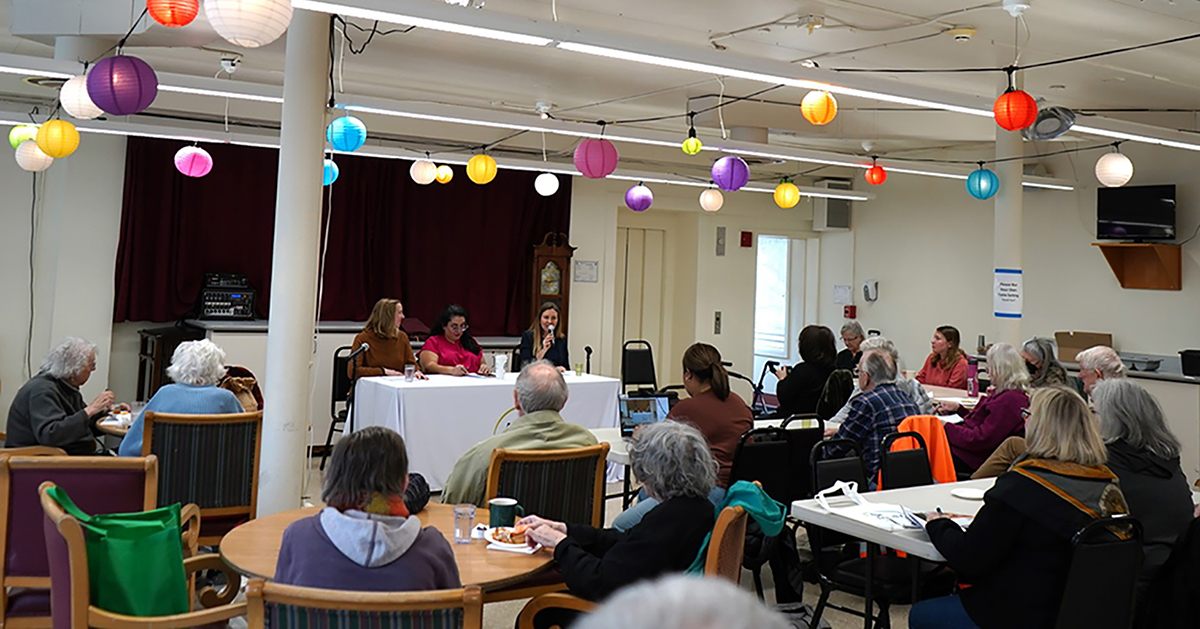Civic Coffee Recap: Navigating the Digital World

Age Friendly Seattle’s Civic Coffee on February 23, 2024—cohosted by the Ballard NW Senior Center—featured a panel presentation on digital navigation and local resources to help older people navigate the digital world. Panelists Sarah Carrier, privacy program manager with Seattle Information Technology, and Sharonne Navas, co-founder and executive director of Equity in Education Coalition discussed digital navigation.
The Equity in Education Coalition is a statewide organization in Washington working towards a targeted and comprehensive approach to improve educational achievement, growth and close the opportunity gap for under-represented groups. Digital equity became an integral part of the services they offer during the pandemic due to the need to use technology to stay connected with loved ones—but using technology was and persists to be a challenge for many people, including many older adults. Sharonne shared an anecdote from the pandemic—she had to teach her mom how to start a video call—which made her realize that this is a challenge for many people.

Sarah Carrier, Seattle Information Technology; Sharonne Navas, Equity in Education Coalition; and Dinah Stephens, Age Friendly Seattle presented at the Feb. 23 Civic Coffee on digital navigation. Couldn’t attend? Click on the image above to open the video recording on YouTube.
The Tech Connect Washington community helpdesk is a local service that provides free technical support to Washington residents, helping them to engage in a virtual environment. Their services can be found through their website, by calling toll-free 800-216-1132, or by chatting with the technicians on Facebook or WhatsApp. Tech support is offered in 12 languages. Sharonne mentioned the importance of language accessibility in their services and supporting under-represented communities with their digital navigation.
Sarah mentioned that privacy concerns in the digital world are a risk for people of all ages. These risks can be heightened for older adults as they have become vulnerable to scams. She said that one of the big privacy concerns is phishing—when someone tries to lure sensitive information or data by disguising themselves as a trustworthy source. This can happen through e-mail, viruses, or phone calls.
To identify potential scams and threats, Sarah advises people to pay attention to misspellings in e-mail and text messages as well as unfamiliar senders with inconsistent or unusual e-mail addresses, links, and domain names. Reputable companies or organizations like your medical provider or bank will not ask you to send sensitive information over e-mail. A good rule of thumb: If it feels off, trust your intuition.
A great resource to reduce the number of unwanted calls is the National Do Not Call Registry which is designed to stop telemarketing calls.
In an instance where you accidentally click a wrong link, it is important to talk to someone, whether it’s a family member or friend who may be knowledgeable in the digital world. Also, it’s crucial to report what happened if you entered sensitive information like a bank account number. Sarah said that, just as you would call your bank if you lost your debit card, if you are phished, the first thing you should do is call your bank and let them know what happened.
In Sharonne’s experience supporting people of all ages and demographics with digital equity, one common challenge when learning about technology is the fear of being wrong or judged for not knowing. This is prevalent in navigating the digital world as it is an ever-evolving landscape and it is easy to become overwhelmed with its complexities and challenges.
The work that Sarah’s team does with City of Seattle departments to overcome that challenge is building practices that preserve privacy in the services provided to Seattle residents. This way, people feel comfortable interacting with the City. Also, Seattle Information Technology’s public facing website offers ample reputable resources and guides for digital navigation.
Sarah emphasized the importance of her team’s work across City departments, helping employees understand risks, tools from emerging technologies such as generative artificial intelligence (AI), and ways to mitigate potential concerns in the services that are provided to Seattle residents.
Age Friendly Seattle thanks both panelists for this insightful conversation and sharing local resources that support older adults with digital navigation.
 Fathima Garcia is an intern with Age Friendly Seattle. She graduated from Seattle Central College with an associate degree in Business Administration in June 2023. She is currently studying Human Resources Management at the University of Washington Foster School of Business.
Fathima Garcia is an intern with Age Friendly Seattle. She graduated from Seattle Central College with an associate degree in Business Administration in June 2023. She is currently studying Human Resources Management at the University of Washington Foster School of Business.
This article appeared in the April 2024 issue of AgeWise King County.
Age Friendly Seattle Civic Coffees
 Stay connected with Age Friendly Seattle to learn about upcoming Civic Coffees and other events in 2024. Visit seattle.gov/agefriendly/programs/events and bookmark Aging King County’s Age Friendly Live—Virtual Events webpage.
Stay connected with Age Friendly Seattle to learn about upcoming Civic Coffees and other events in 2024. Visit seattle.gov/agefriendly/programs/events and bookmark Aging King County’s Age Friendly Live—Virtual Events webpage.
Age Friendly Seatle’s Civic Coffees are video recorded and available to view after the event on YouTube. See the Civic Coffee playlist here.
Follow Age Friendly Seattle on Facebook and X/Twitter. For more information, e-mail agefriendly@seattle.gov.
![Aging & Disability Services for Seattle & King County [logo]](https://www.agingkingcounty.org/wp-content/themes/sads/images/seattle-ads-logo.png)